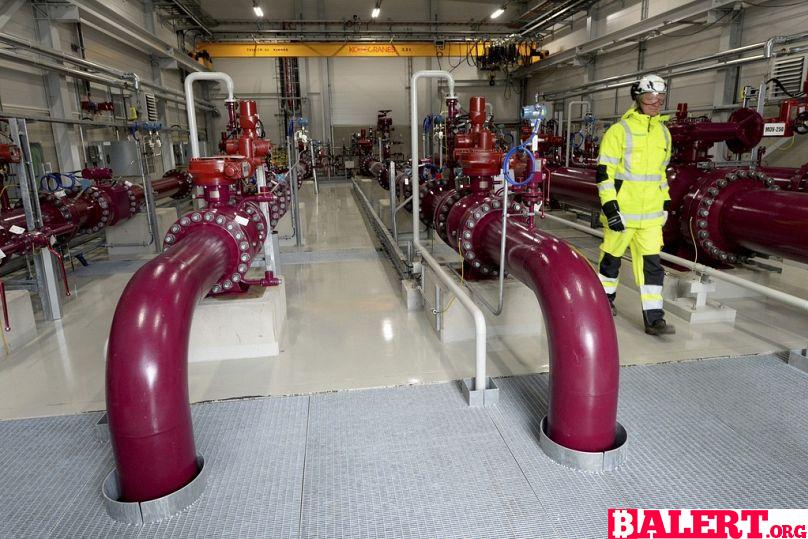World
The EU’s Energy Transition: Strategies for a Sustainable Future
Explore the EU’s comprehensive strategies for a sustainable energy transition. Discover innovative policies, renewable energy initiatives, and collaborative efforts aimed at achieving a greener future while addressing climate change challenges.

The EU’s Energy Transition: A Path Towards Sustainability

The European Union is navigating a pivotal moment, facing the intertwined crises of urgent climate change and escalating geopolitical tensions. The consequences of climate change are becoming increasingly apparent, while recent energy disruptions triggered by Russia’s invasion of Ukraine have exposed the EU’s vulnerabilities. In response, the European Green Deal—a commitment embraced by all member states—calls for a swift transition away from natural gas. This transition poses both significant challenges and remarkable opportunities for the region.
In the Baltic-Finland area, natural gas consumption differs notably among countries, with Finland utilizing 3%, Estonia 6%, Latvia 16%, and Lithuania 19% of their energy needs from this source. While these figures may seem relatively low, natural gas remains vital for heating and other essential services. The energy crisis of 2021, which led to extreme price fluctuations, underscored the risks associated with this dependency. While prices have since stabilized, the environmental and geopolitical threats persist, highlighting an urgent need for decarbonization.
‘No-regret’ Policies: A Crucial Element
In 2023 alone, the EU’s natural gas production resulted in an alarming 0.75 billion tonnes of CO2 emissions, emphasizing the need for robust decarbonization strategies. These strategies advocate for a shift from natural gas to renewable hydrogen and biomethane, alongside initiatives such as electrification and energy optimization. These transformative measures are essential for establishing a decarbonized and resilient gas system in the EU, ensuring stable prices and a dependable supply for consumers.
A recent report titled “Gas Decarbonisation Pathways for Estonia” outlines four potential routes to achieving carbon neutrality for the Baltic-Finland gas zone by 2050:
- Continuing with current policies
- Failing to achieve carbon neutrality by 2050 (business-as-usual scenario)
- Transitioning from natural gas to renewable hydrogen (renewable hydrogen scenario)
- Replacing natural gas with renewable methane/biomethane (renewable methane scenario)
- Integrating both renewable hydrogen and methane to phase out natural gas, while balancing decarbonization with cost-effectiveness (cost-minimal scenario)
Among these, the cost-minimal scenario stands out as the most feasible, with an estimated investment of €9.01 billion required by 2050 to develop the necessary infrastructure. This approach aims to reduce natural gas imports by 2040, thereby enhancing energy independence and security. Utilizing existing infrastructure, such as the Klaipeda LNG terminal, allows for efficient demand management, reducing the necessity for new, expensive projects.
This scenario prioritizes the deployment of biomethane and the establishment of rigorous emission reduction targets, aligning with broader environmental objectives. Projections indicate that CO2 emissions across all participating countries could plummet to less than 0.2 million tonnes by 2030, setting the stage for a carbon-neutral regional gas market.

Adaptation: Building on Current Infrastructure
Successfully navigating the energy transition requires comprehensive coordination between the gas and electricity sectors. This includes aligning the expansion of renewable energy infrastructure with enhancements to gas infrastructure. Adapting existing facilities, such as Latvia’s underground gas storage, to accommodate new gases and manage peak demand periods is essential. A thorough reassessment of gas network development plans will ensure the feasibility of supplying gas to smaller, remote areas.
The financial commitment required for gas sector decarbonization, while significant, is justified by the long-term environmental and economic benefits it promises. For instance, the average production costs of biomethane, projected to be the dominant fuel by 2050, are expected to be substantially lower than current natural gas prices, estimated at €52.5/MWh compared to €96/MWh. This transition not only promises increased economic output and job creation but also long-term reductions in energy costs and decreased reliance on imported fuels.
The costs of inaction are staggering, affecting not only economic stability but also human life and environmental health. The year 2023 has already been marked as the hottest on record, accompanied by unprecedented extreme temperatures and “once-in-a-century” storms that have led to widespread drought, disease, and resource conflicts. These adversities disproportionately affect the most vulnerable populations, exacerbating existing inequalities and threatening livelihoods.
A Transformative Opportunity Awaits
The Baltic-Finland common gas market presents a transformative opportunity to significantly reduce overall gas demand and import needs, thereby alleviating regional geopolitical risks. By advancing this transition, we can not only confront immediate environmental threats but also align with the EU’s broader sustainability goals, setting a benchmark for responsible energy practices.
The moment for decisive action is now. We are presented with a unique chance to secure a sustainable and equitable energy future for the Baltic-Finland region and beyond. Postponing these initiatives only magnifies risks and expenses, while prompt actions can pave the way for a resilient and prosperous future. It is imperative that policymakers capitalize on this moment to steer us toward a cleaner, greener energy landscape.
Gowtham Muthukumaran and Javad Keypour are energy experts at the Stockholm Environment Institute’s Tallinn Centre.
At Euronews, we believe every perspective is important. Reach out to us at view@euronews.com to share pitches or submissions and contribute to the dialogue.
World
Dominique Pelicot Testifies in Harrowing Rape Trial
Join us as Dominique Pelicot courageously testifies in a harrowing rape trial, shedding light on the complexities of trauma and justice. Her powerful story raises crucial questions about the legal system and the importance of support for survivors.

Dominique Pelicot Takes the Stand in Shocking Rape Trial
In a courtroom drama that has captivated France and garnered international attention, Dominique Pelicot, the man at the center of a harrowing rape trial, finally addressed the court. With tears streaming down his face, he recounted how his wife had been instrumental in helping him cope with a tumultuous past marked by trauma. He revealed that he had endured a sexual assault at the tender age of nine while hospitalized, and he also witnessed a gang rape during his teenage years while working as an apprentice electrician on a construction site.
“She didn’t deserve this, I acknowledge that,” Mr. Pelicot stated, his voice barely audible as he struggled to convey his emotions. The gravity of the situation weighed heavily on him, and the courtroom fell silent, straining to catch his every word.
Now 71 years old, Mr. Pelicot faces serious allegations of drugging his wife, Gisèle Pelicot, whom he has been married to for half a century, over a span of nearly ten years. Prosecutors contend that he used drugs to render her comatose, allowing him to rape her repeatedly. Furthermore, authorities allege that he went so far as to invite numerous men into their home, facilitating a nightmarish scenario where they, too, engaged in the assault of his wife.
Overall, 51 men, including Mr. Pelicot, are on trial concurrently, primarily facing charges related to the aggravated rape of Ms. Pelicot. Among them, one individual has already pleaded guilty to similar crimes, admitting to drugging his own wife to assault her and inviting Mr. Pelicot to partake in the horrific act while she was incapacitated.
Mr. Pelicot’s unexpected testimony came after a tumultuous start to the trial. Just a week in, he was stricken with severe health issues that forced him to miss four consecutive days in court. The head judge ultimately decided to postpone proceedings, as Mr. Pelicot was diagnosed with kidney stones, a kidney infection, and prostate complications, adding yet another layer of complexity to this already harrowing case.
World
Meta Bans Russian State Media Outlets from Social Media Platforms
Explore the implications of Meta’s decision to ban Russian state media outlets from its social media platforms. Understand the impact on information dissemination and the ongoing battle against misinformation in the digital landscape.

Meta Imposes Global Ban on Russian State Media Outlets
In a significant move, Meta Platforms, Inc., the parent company of Facebook, has announced the prohibition of Russian state media outlets, including RT (Russia Today) and Rossiya Segodnya, from all its social media platforms. The decision stems from the company’s concerns regarding the deceptive strategies employed by these media organizations to execute covert influence operations across the internet.
Meta made this announcement on Monday, emphasizing that the ban will be enforced worldwide across its various platforms, such as Instagram, WhatsApp, and Threads. The rollout of this ban is expected to take place over the coming days.
Statement from Meta
A spokesperson for Meta elaborated on the decision, stating, “After careful consideration, we have expanded our ongoing enforcement actions against Russian state media outlets. As a result, Rossiya Segodnya, RT, and other affiliated entities are now banned from our applications globally due to their involvement in foreign interference activities.”
For further insights into this development, watch the video in the player above.
World
Trump Recalls Alleged Assassination Attempt While Golfing
Explore Donald Trump’s chilling recollection of an alleged assassination attempt he experienced while enjoying a round of golf. Delve into the tense moments and his reflections on safety, fame, and the unpredictability of public life.

In a recent interview on the social media platform X, Republican presidential nominee Donald Trump recounted a harrowing incident he claims to have experienced while playing golf. Trump described how, during a peaceful Sunday morning round with friends, the tranquility of the day was abruptly shattered by the sound of gunfire in the air.
“It was a beautiful day, everything was just perfect,” Trump reflected. “Then all of a sudden, we heard shots being fired—probably around four or five in total.” He went on to explain that a Secret Service agent was the first to spot the suspect, who was allegedly armed with an AK-47, a powerful assault rifle.
“The agent saw the barrel of the weapon and immediately took action, returning fire at the barrel and aiming in the direction of the bushes,” Trump detailed. “I would have loved to have sunk that last putt, but we decided it was best to leave the scene promptly.”
Trump expressed his gratitude towards the agents and a vigilant civilian who aided in tracking down the suspect, who was eventually apprehended following a high-speed chase.
Suspect Faces Multiple Federal Gun Charges
The FBI has identified the suspect as Ryan Wesley Routh, accusing him of targeting Trump during his time at the golf club in West Palm Beach, Florida. According to an FBI report, Routh had allegedly hidden among the hedges of the golf course for an astonishing 12 hours. Authorities discovered an SKS-style assault rifle, a GoPro camera, and a bag of food at the scene.
The 58-year-old Routh is now facing two serious federal gun charges. If convicted on both counts, he could face a combined maximum sentence of 20 years in prison. Notably, neither of the charges is directly related to an assassination attempt. The first charge pertains to possessing a firearm despite a prior felony conviction, which carries a potential 15-year sentence, a fine of $250,000 (€225,000), and three years of supervised release.
The second charge involves possession of a firearm with an obliterated serial number, which could result in a five-year prison term, the same financial penalties, and also three years of supervised release. As the investigation continues, additional charges could be forthcoming.
While the motive behind Routh’s actions remains unclear, his digital footprint reveals strong political affiliations, particularly concerning issues surrounding Ukraine and China. Routh consistently expressed support for Ukraine across various social media platforms, even claiming to have orchestrated a recruitment scheme for international volunteers aiming to assist Ukraine in its fight against Russia’s invasion. This behavior has been denounced by Ukrainian soldiers and members of the International Legion, who disavowed Routh’s actions and motives.
-

 Business5 months ago
Business5 months agoThe Significance of Jackson Hole: A Central Banking Tradition
-

 Tech4 months ago
Tech4 months agoNew Leaks and Features About the Samsung Galaxy S25 Ultra
-

 Business6 months ago
Business6 months agoObituary: Dan Collins
-

 Article7 months ago
Article7 months agoCreative Design Applications Developed with Artificial Intelligence
-

 Business4 months ago
Business4 months agoBhutan’s Strategic Investment in Bitcoin: A New Era for the Himalayan Kingdom
-

 World4 months ago
World4 months agoThierry Breton Resigns: Impact on European Union Leadership
-

 Gaming4 months ago
Gaming4 months agoNew Details and Trailer Released for Dead Rising Deluxe Remaster
-

 Gaming4 months ago
Gaming4 months agoNew Details for Alan Wake 2 and PlayStation 5 Pro Announcement












